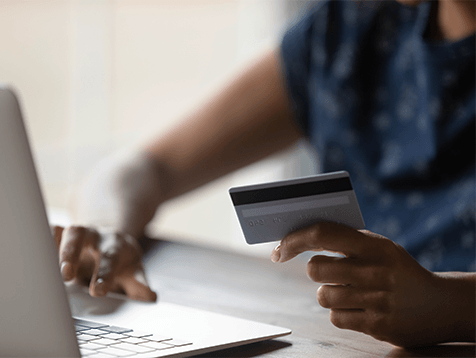In this article
What happens if you don't pay a credit card bill
Have you ever missed a credit card bill? Find out what may happen.

In this article
Missed credit card payments can lead to accruing interest, decrease in credit scores, and even a long-lasting effect on your credit history. It is important to understand what other things might happen if you don't pay a credit card bill and the potential consequences so that you can avoid any kind of long-term impact.
Have you been wondering ‘what happens if I can't pay my credit card in full?’ Can you just make minimum payments every month and get away with it? Well, the short answer is no.
Credit card providers have different ways of dealing with missed credit card payments, which might lead to the following consequences:
1 - Decrease in credit score
Credit cards affect your credit score directly. Repayments make up for over 40% of your total credit score. That means, the credit score on the credit report may suffer depending on the overdue amount on the credit card.
You will face more significant implications if you delay paying for a longer period. The later you pay your bill, the worse it will be for your credit scores.
2 - Late fees and high interest rate
A missed credit card bill can attract late fees and high interest rates. Even if you make a minimum payment to avoid a late fee, the rest of the unpaid balance is rolled over to the next month with interest accrued over it according to the APR on credit cards.
In case you do get charged with a late credit card fee, interest will be incurred on that as well. As a result, multiple subsequent late payments can lead to accruing interest over time. You may end up paying more in interest than the total principal amount.
3 - Reward points can get affected
If you cannot make a payment of the overdue amount on your credit card statement, credit card companies may freeze or end your reward program benefits altogether.
4 - Difficulty in getting a new credit card
When you already have missed repayments marked on your credit report and a bad credit score because of it, getting a new line of credit can become challenging. Lenders are doubtful of extending credit to individuals who have previously shown finance mismanagement and missed out on payments. While you may still be able to get approved for credit cards for bad credit, the interest rate will be much higher compared to standard credit cards.
5 - Your account may get closed
An unpaid credit card debt account that goes 180 days past due can face a charge off. A charge-off simply implies the debt on your credit account is written off as a loss and the account will then get closed permanently. This, however, does not mean you don’t have to pay the owed amount. You are still legally required to pay the unpaid credit card debt in full. It's just your credit card account gets closed and you are not allowed to use the card anymore.
A credit account that has faced a charge-off can stay on your credit report for up to seven years. This can also make it challenging to apply for loans in the future and affect your credit score.
Here are a few things you can do if you miss a miss credit card payment, which can help you get back on track:
Maintain communication with the credit card provider
Communicating with the lender honestly and explaining your circumstances is key. Your credit card provider may send you due notices for missed credit card payments. Simple actions, such as responding to creditors when they reach out via email or call instead of ignoring them, can go a long way. If you negotiate with creditors early, they may be more willing to cooperate with you.
Request a change in payment due date
Many credit card providers have measures to assist borrowers in making payments. If you think you won’t have the funds to make card payments for the given month, call your credit card provider before missing the payment deadline. You can request a change of payment due date to avoid receiving a late payment fee.
Budget your credit card payments
It's a good idea to budget your credit card payments after reviewing your income and expenses. You can reduce monthly expenses to save extra money which can be directed towards paying your credit card overdue amount. This will help to avoid missed credit card payments. Moreover, it's just as important to only use credit cards for necessary expenses.
Pay your credit card bill as soon as you can
As soon as you gain a substantial amount of funds, pay off your credit card bills immediately instead of waiting for the due date to arrive. Making regular payments, whenever you can help negotiate better with your credit card provider in case you do get late on payments for a month or two. It will have an even greater impact if you can pay more than the minimum amount to avoid compounding interest.
Set up automatic payments
Sometimes we completely forget about our credit card bills because of how busy we are. If you have difficulties remembering payment dates, set up automated payments so that you will not miss any bills at all.
Your credit card company will deduct funds from your bank account automatically to cover your credit card. Simply ensure that you have adequate funds in your bank account to handle payments.
Avoid making purchases using your credit card
When you see a big credit limit available, it can be alluring to use it for buying things you don’t even necessarily need at the moment. That is why, it's a good idea to avoid making purchases from your credit card altogether.
Instead, make purchases using only debit cards or cash to avoid overspending. This will help you save some cash while looking for more funds for your credit card bills, depending on the amount due.
Consider a hardship variation
A hardship variation involves a payment pause for a limited time because of hardship, such as a serious illness or job loss. If you are unsure of when you’ll be capable of making your credit card minimum payment, then your next step should be to consider a hardship variation.
You can ask your credit issuer to review the terms of the contract. Since a hardship variation is a formal legal process, your credit issuer can offer other options, such as freezing your account until you get back on your feet.
Consider balance transfer
If you have been struggling to pay off multiple credit card bills, all with high interest rates, you can consider a balance transfer. With a balance transfer credit card, you can transfer debts from multiple credit cards into one low interest card or zero interest card.
Most balance transfer cards offer low interest rates for a short introductory period which you can use to pay off your debts without accruing interests.
Paying your credit card bills on time can help you avoid long-term consequences and keep your credit score in good shape. You should also monitor your credit reports routinely to understand how missed payments are hurting your credit. It's just as important to review credit reports to ensure any timely payments aren’t marked as missed.
Check credit reports for free with ClearScore and get credit score anytime, in just a few clicks. Take a look.
Doug loves to work with lenders to get ClearScore users the best deals
